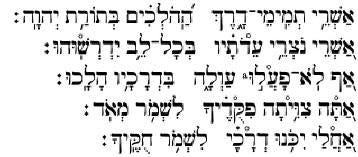We’ve reached Psalm 119, the great Torah Psalm.
Psalm 119 is one of several alphabetic acrostic poems in the book of Psalms. Psalm 119 is a song about delighting in the Law of God. To make this point visually, the psalm has its 176 verses divided into 22 stanzas of eight lines each. Each of the 22 stanzas corresponds to a letter of the Hebrew alphabet and each of the eight lines within a given stanza starts with the letter governing that stanza. Thus, stanza one is Alef, the first letter in the Hebrew alphabet, and each of the eight lines in the first stanza begins with the letter Alef. The next stanza is Bet. All the way to the final stanza of Tav. Visually, English readers of Psalm 119 can’t see this. For example, here are the first verses of Psalm 119, the Alef section. Look to the right, where Hebrew sentences start:
You can see, reading from right-to-left as you do in Hebrew, that each line begins with the letter Alef.
The point of the letterplay in Psalm 119 is to show how the Torah structures our whole lives. This is communicated not just in the meaning of the text but in the visual display of the text on the page.
Regarding the meaning of the text, you probably know that Psalm 119 is the longest chapter in the Bible. And of its 176 verses, 171 reference God’s laws, statues, commands, judgments, instructions, ordinances, mandates, decrees, teachings, or precepts. These aren’t just English synonyms for “law.” Scholars count 7-8 “Torah terms” in Psalm 119, words like torah, ‘edot, piqqudim, huqqim, mitzvot, mishpatim, ’imrah, and davar.
As I mentioned when we reflected on Psalm 112, this intense focus upon God's laws in Psalm 119 doesn't tend to sit well with many modern Christians. Especially those who are deconstructing from high control religious environments. Rules and regulations feel restrictive and coercive to us, rather than as expressions of care, love, attention, help, and grace. But that's how the Hebrews saw it, God's law was loving. “Your word is a lamp for my feet and a light on my path.” Without this light we, as children, would wander in the darkness. We'd become lost in the night and never find our way back home. If you're standing a blackout dark being given a flashlight is a grace.
A good metaphor here might be parenting styles. As described by psychologists, parenting styles are a mixture of structure and care. Authoritarian parents have high structure but low care. Many rules but little affection. Permissive parents, by contrast, express affection and care but have low structure, few rules or boundaries. Neither environment, permissive or authoritarian, is good for children. The best parents are described as Authoritative, where structure and care are present in equal measure. In these spaces, there are clear and consistent rules and boundaries. But these rules and boundaries are generously and reasonably placed and couched within a responsive and loving environment. As we all know, children need both structure and care.
To be sure, this might be a cringy metaphor, but what we find in Israel's experience with God is an authoritative parenting style. As we experience in Psalm 119, there is structure and clear guidance. And those rules are experienced within God's hesed, God's faithfulness, goodness, and kindness. Rules exist, but when we stumble and fall God does not treat us as our sins deserve.
Antinomian, anarchical lawlessness isn't good for anyone. God isn't a permissive parent. But neither is God an authoritarian tyrant. God's laws are gifts because they provide us a light in the darkness. And even when we do fail, God is compassionate and gracious, slow to anger and abounding in faithful love.



